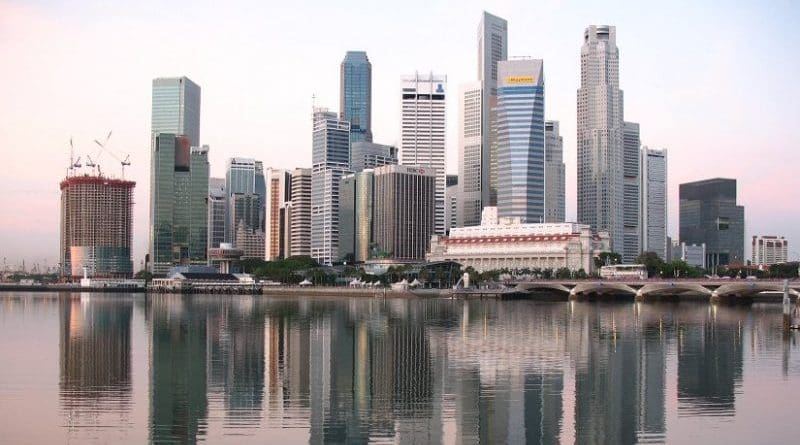Singapore’s Approach To Africa: Promising, But More To Do – Analysis
By RSIS
Africa is one of the few regions globally presenting high double digit growth possibilities. Singapore is testing the waters as Africa embarks on a decisive transformational journey towards prosperity.
By Robert MacPherson*
Africa is turning an important corner in its development path, embarking on what could be a decisive transformational journey in the direction of prosperity. Responding to a strong undercurrent of economic opportunity across Africa, Singapore has begun testing the waters as Europe, China and the United States double down on their endeavours.
However, with 54 national markets of varying degrees of attractiveness and complexity entry into the Africa market requires patience, diligence and a highly customised local approach. Nevertheless, the verdict for many is that Africa will be one of the few regions globally presenting high double digit growth possibilities.
Singapore’s Growing Partnership with Africa
In 2015, cross-border M&A activity spiked to US$20 billion from only US$5 billion in 2014. Moreover, private equity investment grew by 51%, much of which was squarely focused on areas reinforcing long-term growth, such as telecommunications and financial services.
While the majority of foreign investment is originating from China and the West, Southeast Asian FDI into Sub-Saharan Africa is also on the rise. Investment reached US$18 billion in 2014, with Singapore emerging as a key player contributing over US$16 billion in FDI in 2013 and trade growth of 12 percent reaching around US$10 billion.
Singapore’s growing partnership with Africa may reflect a motivation to achieve greater diversification among trade and investment partners. With the highest trade to GDP ratio globally, Singapore’s disproportionate reliance on trade can exacerbate consequences during economic slowdowns among primary trading partners. Reducing this susceptibility is encouraging economic interaction with far corners of the world.
The recent surge with Latin America could be an indicator of the trade levels, investment and government engagement to be expected down the road in Africa.
At the strategic level, perhaps Africa and Latin America are not too distant cousins. Both regions present an opportunity to achieve greater economic diversification in regions characterized by an abundance of resources and emerging middle class. While on-the-ground dynamics can differ greatly, Singaporean companies will require a comparable budget and encounter similar entry barriers during the expansion process.
Downside: Lacking Robust Framework
Investment levels into Africa lag behind Latin America by about 15 years; however, activities attributed to accelerating economic ties with Latin America historically are being observed in nascent stages in the Africa context.
IE Singapore, the Singapore government agency promoting trade and overseas investments, has established country offices in 2013 in South Africa and Ghana. Similar to IE Singapore in Mexico and Brazil, these two Africa offices will be foundational in catalysing new investment activity.
In the case of Latin America, the Forum for East Asia-Latin America Cooperation was inaugurated under Prime Minister Goh Chok Tong in 1998 to establish a link between East Asia and Latin America. Several years later in 2004, IE Singapore established the ASEAN-Latin America cornerstone event, the Latin Asia Business Forum.
In the subsequent ten years, Singapore’s bilateral trade with Latin America grew at a compound annual growth rate of 21.2%, reaching US$21.5 billion in 2013. During this period, Singapore also entered into free trade agreements with Panama, Peru, Chile and Costa Rica.
In comparison, there is a far less robust cooperation framework with Africa, but Singapore is beginning to move in a similar direction. Mirroring the successful Latin Asia Business Forum, IE Singapore also launched an Africa Singapore Business Forum in 2010 to help to connect and identify joint business opportunities.
Need to Leverage on Singapore’s Expertise
While Singapore has yet to enact free trade agreements with Africa, there have been bilateral investment treaties negotiated with Burkina Faso and the Ivory Coast, as well as an Air Services Agreement with Zimbabwe in 2014.
Singapore also shares developmental experience with African countries under the Singapore Cooperation Programme, recently signing a memorandum of understanding with Rwanda in 2015. Moreover, the Singapore Ambassador to the African Union recently suggested that Ethiopia and Singapore “should consider signing a cultural cooperation agreement”.
While Singapore does not match the level of scale as compared to the West or China, it does offer deep expertise that could address some of Africa’s most pressing challenges. World class capabilities in infrastructure, shipping, airports, energy, and water management, correlate with challenges in Africa responsible for severe economic bottlenecks.
According to IE Singapore, in 2013-2014 there were already more than 60 Singaporean companies operating in over 50 countries in Africa. Projects spanned a wide range of sectors from agri-business, food & beverage, and oil and gas, to eGovernment services, communications technology, and transport & logistics.
While Singapore’s engagement in Africa is not as familiar as the common narrative around Chinese, American and European investment, the growing interest and seriousness is promising.
*Robert MacPherson is an adjunct researcher of the NTU-SBF Centre for African Studies at Nanyang Business School. The centre is a joint initiative of Nanyang Technological University and the Singapore Business Federation. He contributed this specially to RSIS Commentary.


It’s an excellent initiative but the pace very slow as the presence of Singapore in smaller African territories is not visible therefore,i agree that more need to be done